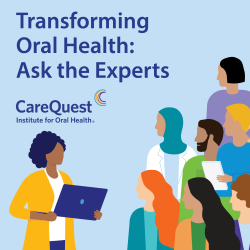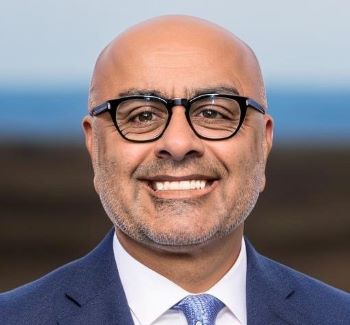Enter your email to receive the CareQuest newsletter:
July 29, 2024
By Kaz Rafia, DDS, MBA, MPH, Chief Dental Officer and Executive Vice President of Health Equity, CareQuest Institute
As we began creating self-paced courses for CareQuest Institute, we took a closer look at terminology in oral health care — terms like “value-based payment,” “fee-for-service,” “interoperability,” and “care coordination.” One phrase continued to give us pause and generate thoughtful discussion: social determinants of health.

First, a definition: The phrase “social determinants of health” refers to external factors that impact the quality of care a person receives. Eighty percent of a person’s health outcomes and quality of life are driven by these factors — where they live, access to housing, education, and transportation.
While those factors are well known and researched, and their impact on the lives of marginalized populations are immense, the very word used to group them together is troubling.
The word “determine” means to completely terminate, limit, and fix the bounds of. This paints a picture of a sealed fate, something that people and communities can’t change no matter how hard they try. It falsely implies a lack of power by advocates and communities to alter, overcome, or reposition those very factors. It mentally draws a fixed outline of a map of the system that has perpetuated inequities and needs change.
Through advocacy, research, health transformation, philanthropy, and education, CareQuest Institute is working to create a more accessible, equitable, and integrated oral health care system. To do that, we need to empower communities to make changes so they can overcome barriers to accessing oral health care, like social determinants of health.
Together as a team, we worked together to figure out how to change that word and the biases that come with it.
Acknowledging the Power, Agency, and Resilience of Communities

The factors that make up social determinants of health are real. Inequities in health outcomes that are caused by them are real. Communities that contend with them every day are also real.
The factors, however, don’t determine the inequities and set them in stone.
Rather, those factors drive the inequities. They are drivers in inequities in access to oral, behavioral, and physical care, in life expectancy, maternal health, childbirth, and survival rates, substance use, and other behavioral health disorders.
Advocates and communities have the agency, knowledge, and resilience to overcome these drivers and have demonstrated the ability to do so.
From now moving forward, we as CareQuest Institute will refer to factors like zip code, access to housing, education, and transportation as social drivers of health to acknowledge the power, agency, and resilience our communities have shown in overcoming them, despite their magnitude and impact.
These drivers are movable, mitigable, and transient. We are changing this term to show that nothing determines the fate of our communities other than our communities themselves.
Editor’s Notes:
Kaz Rafia, DDS, MBA, MPH, serves as chief dental officer and executive vice president of health equity at CareQuest Institute.
In his role, Rafia spearheads strategic initiatives to foster and advance engagement and access to integrated oral health care for the underserved and for underrepresented communities. Rafia also drives the organization’s efforts to elevate the integration of oral health and overall health care through the oversight of the health improvement and grantmaking teams.
Read more Transforming Oral Health: Ask the Experts blog posts, covering topics like health equity and interoperability, at carequest.org/latest-news/blog.